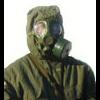Well, obviously not in *every* case. Sadly, the vocabulary and diagnostic repertoire of psychiatry are still embarrassingly primitive, so we can only really speak of "depressed mood" and "treatment resistant depression". However, there is solid research suggesting in some circumstances it involves serious immune malfunction. As far as I could find, no previous thread has mentioned these studies so here they are.
First, the Th17 branch of the immune system is overactive in depressed patients
http://www.ncbi.nlm....ubmed/21129782/
(Oh here is the rat model, of course, http://www.ncbi.nlm....ubmed/23174342/ )
This paper identifies anti-phosphatidyl inositol antibodies as being active in MDD (and ME/CFS)
http://europepmc.org...ct/med/18063934
Perhaps this is why inositol supplements help with depression -- they either induce tolerance or simply give the antibodies something else to latch onto, leaving the rest of the body's inositol alone so it can do whatever cell signalling stuff it needs to do.
Now, what is "Th17"? As I understand it, it is a subset of T helper cells devoted primarily to mucous membrane defense, i.e. the gut! It was only discovered recently, but already there are studies implicating it in nearly every autoimmune disease. I won't link all the studies here, but you can easily google Th17 + psoriasis, rheumatoid arthritis, lupus, Sjogren's syndrome, anti phospholipid syndrome, Crohn's disease, vasculitis, type 1 diabetes, etc etc etc. I don't know about the rest of you, but my longtime depression was triggered by EBV, already implicated in other autoimmune diseases, and it certainly has the "flare and remission" pattern characteristic of such diseases.
I can't find it now, of course, but I swear I've read that depression increases the risk of autoimmune disease by something like a factor of 2. I did find this link between schizophrenia and autoimmunity:
http://www.ncbi.nlm....ubmed/16513876/
Researchers have been looking at schizophrenia as a possible autoimmune disorder for at least a decade
http://www.nature.co.../icb20052a.html
Yet the question has barely been raised for depression!
So, you're depressed. The shrink has been moving you from SSRI to SNRI to another SSRI with little to show for it, and you can't get your hands on some NSI-189. You don't exactly feel sad. You feel ill all the time. What will turn down the Th17 system?
Well, the usual stuff - sorry for no links, writing on phone, it's a pain. (Thanks to Hip for some of these!)
Exercise
Fixing sleep cycle
Lowering gut inflammation
Reducing stress
Proline restriction
Intermittent fasting
And the supplemental stuff
Circumin
Retinoic acid
Vitamin D3
Zinc
Ursolic acid (spray is more bioavailable)
Low dose naltrexone (maybe dexreonaltrexone, which could be used in a much higher dose as it doesn't mess with the opioid receptors, only the TLR4 receptors -- OK toll like receptor 4 and lipopolysaccharides aka LPS probably deserve their own thread)
ECGC
Resveratrol
Berberine
DHA
Cannabidiol
N-acetylglucosamine
Propolis
Baicalin
Grape seed extract
Triptolide
Cordyceps
Fucoxanthin
Olive leaf
Luteolin
And that's all I got. Thoughts?



























































